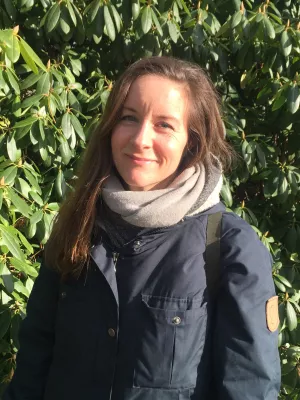
Maria von Post
Forskare

Reconnecting children to nature : The efficacy of a wildlife intervention depends on local nature and socio-economic context, but not on urbanisation
Författare
Summary, in English
Children's interactions with nature are important mediators of health benefits and future relationships with nature and conservation. However, there are growing concerns that children are becoming disconnected from nature as societal changes make natural environments and their affordances less accessible. There is now a need to explore ways to reconnect children to nature. We evaluated bird feeding as an environmental education intervention on species knowledge, attitudes towards birds and well-being of children (aged 10–11 years) in 14 urban and rural schools across three city regions. We used surveys to investigate the role of urbanisation and socio-economic factors in children's relationships with nature and possible modulating effects on the intervention response. Local nature, close to the children's homes, was associated with better well-being and modulated the effect of the intervention on species knowledge: children from areas with less local nature gained more from the project. Urbanisation per se had no direct impacts but did correlate with the types of affordances associated with nature by the children, suggesting differences in how urban and rural children utilise nature. We found that socio-economic factors impacted pre-existing species knowledge and attitudes towards nature. Higher education was associated with better species knowledge. Higher income correlated with children participating in more outdoor activities, which subsequently correlated with more positive attitudes towards birds. Species knowledge also correlated with positive attitudes. We found large differences in the intervention impact between schools, likely explained by a pivotal role of teachers facilitating nature interactions in school-based projects. Our findings show that bird feeding has potential as an intervention to connect children with nature, but ecological and social contexts moderate its efficacy. Local greenspace and socio-economics influenced children's relationships with nature in both urban and rural areas, indicating that local conditions rather than urbanisation levels govern connection to nature. Role models appeared crucial, suggesting that specialised environmental education organisations have significant potential to enhance nature connection through interventions, particularly in areas with low socio-economic levels and sparse nature.
Avdelning/ar
- Centrum för miljö- och klimatvetenskap (CEC)
- BECC: Biodiversity and Ecosystem services in a Changing Climate
- Biodiversitet och evolution
- Biodiversitet och bevarandevetenskap
- Evolutionär ekologi och infektionsbiologi
- Ekologisk och evolutionär fysiologi
- LU profilområde: Naturbaserade framtidslösningar
Publiceringsår
2024-08-21
Språk
Engelska
Sidor
1987-2000
Publikation/Tidskrift/Serie
People and Nature
Volym
6
Avvikelse
5
Dokumenttyp
Artikel i tidskrift
Förlag
Wiley-Blackwell
Ämne
- Environmental Sciences
- Educational Sciences
Aktiv
Published
Forskningsgrupp
- Biodiversity and Conservation Science
- Ecological and Evolutionary Physiology
ISBN/ISSN/Övrigt
- ISSN: 2575-8314